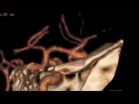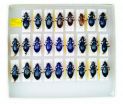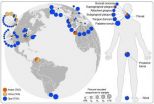(Press-News.org) INDIANAPOLIS -- Children with profound deafness who receive a cochlear implant had as much as five times the risk of having delays in areas of working memory, controlled attention, planning and conceptual learning as children with normal hearing, according to Indiana University research published May 22 in the Journal of the American Medical Association Otolaryngology--Head and Neck Surgery.
The authors evaluated 73 children implanted before age 7 and 78 children with normal hearing to determine the risk of deficits in executive functioning behaviors in everyday life.
Executive functioning, a set of mental processes involved in regulating and directing thinking and behavior, is important for focusing and attaining goals in daily life. All children in the study had average to above-average IQ scores. The results, reported in "Neurocognitive Risk in Children With Cochlear Implants," are the first from a large-scale study to compare real-world executive functioning behavior in children with cochlear implants and those with normal hearing.
A cochlear implant device consists of an external component that processes sound into electrical signals that are sent to an internal receiver and electrodes that stimulate the auditory nerve. Although the device restores the ability to perceive many sounds to children who are born deaf, some details and nuances of hearing are lost in the process.
First author William Kronenberger, Ph.D., professor of clinical psychology in psychiatry at the IU School of Medicine and a specialist in neurocognitive and executive function testing, said that delays in executive functioning have been commonly reported by parents and others who work with children with cochlear implants. Based on these observations, his group sought to evaluate whether elevated risks of delays in executive functioning in children with cochlear implants exist, and what components of executive functioning were affected.
"In this study, about one-third to one-half of children with cochlear implants were found to be at-risk for delays in areas of parent-rated executive functioning such as concept formation, memory, controlled attention and planning. This rate was 2 to 5 times greater than that seen in normal-hearing children," reported Dr. Kronenberger, who also is co-chief of the ADHD-Disruptive Behavior Disorders Clinic and directs the psychology testing clinic at Riley Hospital for Children at IU Health.
"This is really innovative work," said co-author David B. Pisoni, Ph.D., director of the Speech Research Laboratory in the IU Department of Psychological and Brain Sciences. "Almost no one has looked at these issues in these children. Most audiologists, neuro-otologists, surgeons and speech-language pathologists -- the people who work in this field -- focus on the hearing deficit as a medical condition and have been less focused on the important discoveries in developmental science and cognitive neuroscience." Dr. Pisoni also is a Chancellors' Professor of Psychological and Brain Sciences at IU Bloomington.
Richard Miyamoto, M.D., chair of the IU School of Medicine Department of Otolaryngology-Head and Neck Surgery and a pioneer in the field of cochlear implantation in children and adults, said this finding augments other research on interventions to help children with cochlear implants perform at a level similar to children without hearing deficits.
"The ultimate goal of our department's research with cochlear implants has always been to influence higher-level neurocognitive functioning," Dr. Miyamoto said. "Much of the success we have seen to date clearly relates to the brain's ability to process an incomplete signal. The current research will further assist in identifying gaps in our knowledge."
One possible answer may lie in earlier implantation, Dr. Miyamoto said. The age at which children are implanted has been steadily decreasing, which has produced significant improvement in spoken language outcomes. Research shows the early implantation is related to better outcomes in speech and understanding, and it is reasonable to believe that there may be less of a deficit in executive functioning with earlier implantation, said Dr. Miyamoto, who is the Arilla Spence DeVault Professor of Otolaryngology-Head and Neck Surgery and medical director of audiology and speech language pathology at the IU School of Medicine.
Preschoolers in the IU study were implanted at an average age of 18 months, and they had fewer executive function delays than school-age children who were implanted 10 months later, at an average age of 28 months.
Children in the study were divided into two age groups: preschool (3 to 5 years) and school-age (7 to17 years). Using an established rating scale, parents rated executive function in everyday life for children with cochlear implants and for the control group with normal hearing.
"We compared parent ratings and looked at the percentage of children in each group who scored above a cut-off value that indicates at least a mild delay in executive functioning," Dr. Kronenberger said. "In the critical areas of controlled attention, working memory, planning and solving new problems, about 30 to 45 percent of the children with cochlear implants scored above the cut-off value, compared to about 15 percent or less of the children in the normal-hearing sample."
Dr. Kronenberger said the research also shows that many children develop average or better executive functioning skills after cochlear implantation.
"These results show that half or more of our group with cochlear implants did not have significant delays in executive functioning," Dr. Kronenberger said. "Cochlear implants produce remarkable gains in spoken language and other neurocognitive skills, but there is a certain amount of learning and catch-up that needs to take place with children who have experienced a hearing loss prior to cochlear implantation. So far, most of the interventions to help with this learning have focused on speech and language. Our findings show a need to identify and help some children in certain domains of executive functioning as well."
"We are now looking for early markers in children who are at risk before they get implants," Dr. Pisoni said. "It will be beneficial to identify as early as possible which children might be at risk for poor outcomes, and we need to understand the variability in the outcome and what can be done about it."
INFORMATION:
The research was funded by a R01 DC009581 grant from the National Institute on Deafness and Other Communication Disorders.
IU researchers identify pattern of cognitive risks in some children with cochlear implants
2014-05-22
ELSE PRESS RELEASES FROM THIS DATE:
One-third of all brain aneurysms rupture: the size is not a significant risk factor
2014-05-22
VIDEO:
This video depicts microneurosurgical clipping of an unruptured intracranial aneurysm,
which is arising from the bifurcation i.e. branching point of two right
middle cerebral arteries.
In brief, the aneurysm locates in this...
Click here for more information.
The lifetime risk for rupture of a brain aneurysm depends heavily on the patient's overall load of risk factors. However, a recent study by researchers from the University of Helsinki and Helsinki University ...
Clinical trials designed to block autophagy in multiple cancers show promise
2014-05-22
PHILADELPHIA— In the largest group of results to date, researchers from Penn Medicine's Abramson Cancer Center and other institutions have shown in clinical trials that the malaria drug hydroxychloroquine (HCQ) blocked autophagy in a host of aggressive cancers—glioblastoma, melanoma, lymphoma and myeloma, renal and colon cancers—and in some cases helped stabilize disease. Autophagy—an essential process cancer cells need to fuel their growth—is a key troublemaker spurring tumor growth. Block this pathway, many preclinical studies suggest, and anti-cancer agents such as chemotherapy ...
Yale Cancer Center studies find lifestyle changes improve biomarkers for breast cancer recurrence and mortality
2014-05-22
New Haven, CT – A pair of Yale Cancer Center interventional studies involving breast cancer survivors found that lifestyle changes in the form of healthy eating and regular exercise can decrease biomarkers related to breast cancer recurrence and mortality. The abstracts are scheduled to be presented at the 2014 annual meeting of the American Society of Clinical Oncology in Chicago May 30-June 3rd.
"The findings of both studies support a growing body of research that suggests lifestyle interventions lower biomarkers associated with breast cancer recurrence and mortality, ...
Repeated sexual assault victims report more psychological problems than previously thought
2014-05-22
COLUMBIA, Mo. – According to recent studies, one in five adult women and one in 100 adult men have reported being raped. The prevalence increases to two in five among women and one in five among men who report experiencing other forms of sexual violence, such as repeated unwanted sexual contact and sexual coercion. Now, researchers at the University of Missouri have determined that those victims who are repeatedly assaulted, but not necessarily violently raped, show greater levels of psycho-behavioral consequences than earlier thought. The researchers suggest that understanding ...
Male and female sex cell determination requires lifelong maintenance and protection
2014-05-22
MINNEAPOLIS/ST. PAUL (May 22, 2014) – The way in which the sex of an organism is determined may require lifelong maintenance, finds new research from the University of Minnesota. According to the study published today in the journal Developmental Cell, sex-specific transcription factors perform lifelong work to maintain sexual determination and protect against reprogramming of cells from one sex to the other.
Previous research at the University of Minnesota's Department of Genetics, Cell Biology, and Development showed sex determination is not permanent. Using a mouse ...
Study shows how common obesity gene contributes to weight gain
2014-05-22
NEW YORK, NY (May 22, 2014) — Researchers have discovered how a gene commonly linked to obesity—FTO—contributes to weight gain. The study shows that variations in FTO indirectly affect the function of the primary cilium, a little-understood hair-like appendage on brain and other cells. Specific abnormalities of cilium molecules, in turn, increase body weight, in some instances, by affecting the function of receptors for leptin, a hormone that suppresses appetite. The findings, made in mice, suggest that it might be possible to modify obesity through interventions that alter ...
Scientific collections play vital role in conservation biology
2014-05-22
Scientists from the California Academy of Sciences and more than 60 other international research institutions spanning six continents have responded to a recent paper in Science, which questioned current methods of scientific collecting and advocated the use of non-lethal alternatives. The response, led by Luiz Rocha, Ph.D., the Academy's Assistant Curator and Follett Chair of Ichthyology, and co-authored by such science luminaries as Harvard's E. O. Wilson and the Academy's Chief of Science and Sustainability, Margaret (Meg) Lowman, describes in detail the value that scientific ...
A glimpse into nature's looking glass -- to find the genetic code is reassigned
2014-05-22
In the Lewis Carroll classic, Through the Looking Glass, Humpty Dumpty states, "When I use a word, it means just what I choose it to mean—neither more nor less." In turn, Alice (of Wonderland fame) says, "The question is, whether you can make words mean so many different things." All organisms on Earth use a genetic code, which is the language in which the building plans for proteins are specified in their DNA. It has long been assumed that there is only one such "canonical" code, so each word means the same thing to every organism. While a few examples of organisms ...
RI Hospital researcher and colleagues discover protein that may lead to malaria vaccine
2014-05-22
VIDEO:
Jonathan Kurtis, M.D., Ph.D., director of the Center for International Health Research at Rhode Island Hospital, talks about the latest findings in their research to find a vaccine for malaria,...
Click here for more information.
PROVIDENCE, R.I. – Rhode Island Hospital researchers have discovered a protein that is essential for malaria-causing parasites to escape from inside red blood cells. Antibodies to this protein trap the parasite inside these red blood cells. This ...
Growing inequalities make science more of a 'winner takes all' field
2014-05-22
ANN ARBOR—As new research documents growing inequalities in health and wealth, the gap between "haves" and "have-nots" is growing in the field of scientific research itself, says University of Michigan sociologist Yu Xie.
"It's surprising that more attention has not been paid to the large, changing inequalities in the world of scientific research, given the preoccupation with rising social and economic inequality in many countries," said Xie, research professor at the U-M Institute for Social Research and professor of sociology, statistics and public policy.
The forces ...




